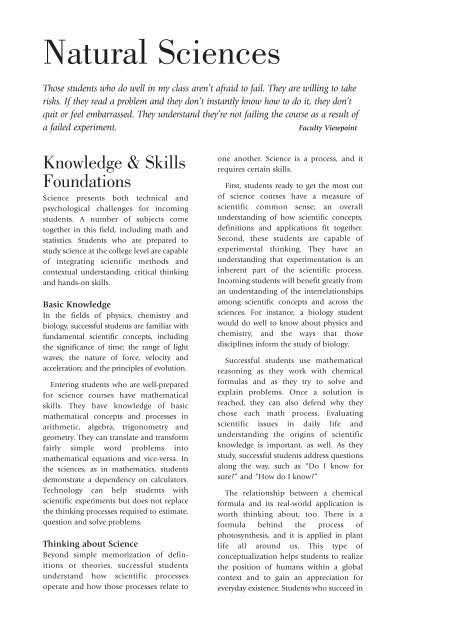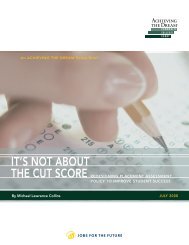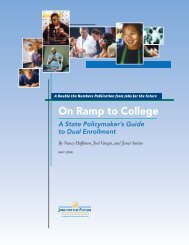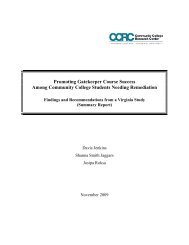Understanding University Success - Educational Policy ...
Understanding University Success - Educational Policy ...
Understanding University Success - Educational Policy ...
You also want an ePaper? Increase the reach of your titles
YUMPU automatically turns print PDFs into web optimized ePapers that Google loves.
Natural Sciences<br />
Those students who do well in my class aren’t afraid to fail. They are willing to take<br />
risks. If they read a problem and they don’t instantly know how to do it, they don’t<br />
quit or feel embarrassed. They understand they’re not failing the course as a result of<br />
a failed experiment.<br />
Faculty Viewpoint<br />
Knowledge & Skills<br />
Foundations<br />
Science presents both technical and<br />
psychological challenges for incoming<br />
students. A number of subjects come<br />
together in this field, including math and<br />
statistics. Students who are prepared to<br />
study science at the college level are capable<br />
of integrating scientific methods and<br />
contextual understanding, critical thinking<br />
and hands-on skills.<br />
Basic Knowledge<br />
In the fields of physics, chemistry and<br />
biology, successful students are familiar with<br />
fundamental scientific concepts, including<br />
the significance of time; the range of light<br />
waves; the nature of force, velocity and<br />
acceleration; and the principles of evolution.<br />
Entering students who are well-prepared<br />
for science courses have mathematical<br />
skills. They have knowledge of basic<br />
mathematical concepts and processes in<br />
arithmetic, algebra, trigonometry and<br />
geometry. They can translate and transform<br />
fairly simple word problems into<br />
mathematical equations and vice-versa. In<br />
the sciences, as in mathematics, students<br />
demonstrate a dependency on calculators.<br />
Technology can help students with<br />
scientific experiments but does not replace<br />
the thinking processes required to estimate,<br />
question and solve problems.<br />
Thinking about Science<br />
Beyond simple memorization of definitions<br />
or theories, successful students<br />
understand how scientific processes<br />
operate and how those processes relate to<br />
one another. Science is a process, and it<br />
requires certain skills.<br />
First, students ready to get the most out<br />
of science courses have a measure of<br />
scientific common sense; an overall<br />
understanding of how scientific concepts,<br />
definitions and applications fit together.<br />
Second, these students are capable of<br />
experimental thinking. They have an<br />
understanding that experimentation is an<br />
inherent part of the scientific process.<br />
Incoming students will benefit greatly from<br />
an understanding of the interrelationships<br />
among scientific concepts and across the<br />
sciences. For instance, a biology student<br />
would do well to know about physics and<br />
chemistry, and the ways that those<br />
disciplines inform the study of biology.<br />
<strong>Success</strong>ful students use mathematical<br />
reasoning as they work with chemical<br />
formulas and as they try to solve and<br />
explain problems. Once a solution is<br />
reached, they can also defend why they<br />
chose each math process. Evaluating<br />
scientific issues in daily life and<br />
understanding the origins of scientific<br />
knowledge is important, as well. As they<br />
study, successful students address questions<br />
along the way, such as “Do I know for<br />
sure?” and “How do I know?”<br />
The relationship between a chemical<br />
formula and its real-world application is<br />
worth thinking about, too. There is a<br />
formula behind the process of<br />
photosynthesis, and it is applied in plant<br />
life all around us. This type of<br />
conceptualization helps students to realize<br />
the position of humans within a global<br />
context and to gain an appreciation for<br />
everyday existence. Students who succeed in






